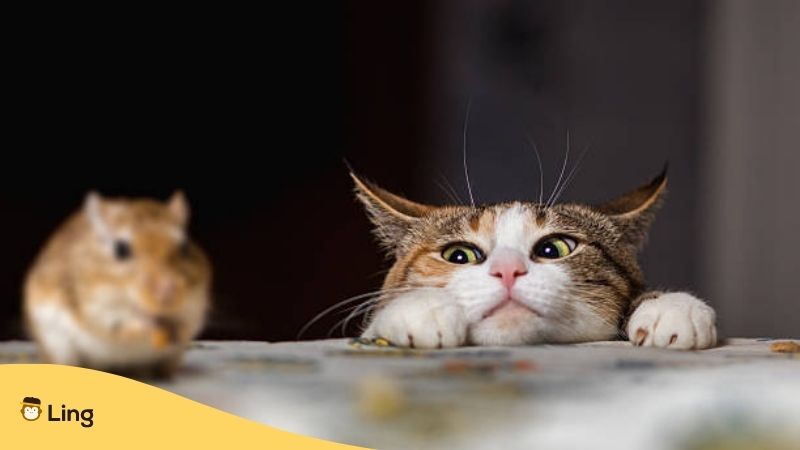When learning the Estonian language, there will come a point where you will know enough to start adding some Estonian idioms to your linguistic arsenal. Using idioms proves that you really have gotten to grips with a language, as they are usually a group of nonsense words that only make sense to a native speaker.
In this blog, we will look at some of the more bizarre idioms used by Estonian speakers as well as some funny ones. As well as helping with your vocabulary, knowledge of a few idioms and Estonian proverbs will help you better understand the country’s culture. So, let’s dive in and explore the eclectic world of Estonian Idioms.
Estonian Idioms
Ära Hõiska Enne Ohtut – Don’t Cheer Before The Evening
This phrase is used in the same way as the English “Don’t count your chickens before they hatch.” It is a warning to Estonians that they should avoid celebrating a victory before they are over the finish line.
Pill Tuleb Pika Ilu Peale – Tears Come After Long Beauty
“All good things come to an end” would be a loose English comparison. Estonians would understand the meaning as a warning that however well things are going now, the good times can at any point come to an abrupt end. The phrase is often heard in the playground before the game children are playing ends in tears.
Igal Oinal Oma Mihklipäev – Every Ram Has His St. Michael’s Day
Similar to the previous idiom, “Every ram has his St. Michael’s Day” refers to the idea that all good things must come to an end. The phrase refers to St. Michael’s Day, which marks the end of the summer and was a day on which a ram was traditionally sacrificed. For the ram, the day definitely marks the end of the good times.
Küsija Suu Pihta Ei Lööda – You Don’t Hit The Asker On The Mouth
A good lesson to learn in any language, this Estonian idiom reminds people to let others question things without fear of repercussions. The phrase can also be used to teach children that it is always polite to ask permission before doing something.
Õnnetus Ei Hüüa Tulles – An Accident Doesn’t Shout When Coming
This sensible idiom has two meanings. The first is a warning always to remain vigilant as disaster is always just around the next corner. The second is a term of consolement for those having a bad time as there is no rhyme or reason for bad things happening to good people.

Kes Ei Tööta, See Ei Söö – Who Doesn’t Work, Doesn’t Eat
A common sentiment in many Estonian idioms is the need to work hard instead of wasting time. This self-explanatory phrase is a reminder that rewards only come to those who put the effort in.
Ära Hõiska Enne õhtut – Don’t Get Too Happy Before The Night Is Over
Meaning don’t celebrate too soon because everything could still end badly.
Kõik Ei Ole Kuld, Mis Hiilgab – Steady Row, Far You´ll Go
“Slow and steady wins the race” would be the English equivalent of this Estonian proverb.
Enda Silmas Palki Ei Näe, Teise Silmas Pindu Küll – You’re Unable To See The Log In Your Eye, But Never Miss The Splinter In Another’s
A biblical reference, this idiom is a rather graphic way of saying although a person can always spot the shortcomings in others, they are blind to the faults they have themselves. It reminds you to sort out your issues before attempting to fix other people and their flaws.
Kes Teisele Nime Annab, See Ise Seda Kannab – He Who Names Another (Person), Will Carry It
Initially, this idiom seems to be one of the more obscure Estonian sayings. In English, it is closely related to the phrase, “Sticks and stones may break your bones, but names will never hurt you.” It is usually associated with bullies and literally means that whatever fault a bully finds in his victim, he probably carries that trait himself.

Magavale Kassile Hiir Suhu Ei Jookse – A Mouse Won’t Run Into The Mouth Of A Sleeping Cat
A phrase that points out that laziness never gets anyone anywhere. Just as a cat can never expect a mouse to run into its mouth, a person should go after what they want rather than wait for it to come.
Julge Hundi Rind On Rasvane – The Brave Wolf’s Chest Is Fat
Yet another strange idiom, this one again deals with the importance of working hard to achieve one’s goals. Being brave is a way to ensure that you are successful.
Ara Karu Nahka Enne Ara Müü, Kui Karu Käes On – He Who Sows The Wind Will Reap A Storm
He who is patient will live a long life.
Jänes Sampust Ei Joo – A Rabbit Won’t Be Drinking Champagne
As with our previous proverb, this one also extols the advantages of being brave to achieve success. In Estonia, rabbits are seen as cowardly and so will never taste the Champagne that is associated with success.
Tühi Kott Ei Seisa Püsti – An Empty Bag Won’t Stand Up
Estonians will be used to hearing this idiom from their grandmothers. It means that no task should be attempted without a belly full of food. A hearty meal is the key to being able to achieve the task you have set for yourself.
Käbi Ei Kuku Kännust Kaugele – The Pine Cone Doesn’t Fall Far From The Tree
In English, we use an apple instead of a pine cone, but the sentiment is the same.
Mida Juku Ei Opi, Seda Juhan Ei Tea – What Juku Doesn’t Learn, Juhan Doesn’t Know
Yet another confusing phrase at first glance, “what Juku doesn’t learn, Juhan doesn’t know,” contains the name Juku, which is a version of the name Juhan used when Juhan was a small child. Therefore we are being told that if you don’t learn something as a child, you will not know it when you are an adult. It is usually told to schoolchildren to encourage them to concentrate on their studies.
Lõpp Hea, Kõik Hea – End Good, All good
And finally, an appropriate Estonian idiom to end on means “All’s well that ends well.”
Come Learn More Estonian With Ling App!

I hope you have enjoyed this brief journey into the weird and wonderful world of Estonian idioms. I you would like to learn more about Estonian, then you can download the Ling app at Google Play and App Store today. Ling offers plenty of fun ways to improve your skills in more than 60 languages including games and quizzes as well as lessons.































